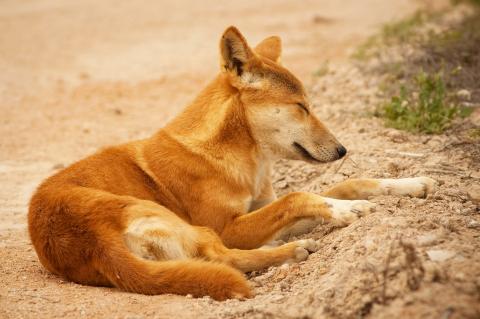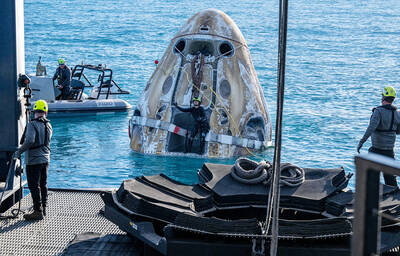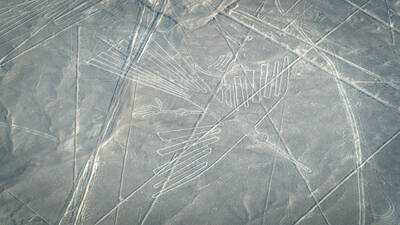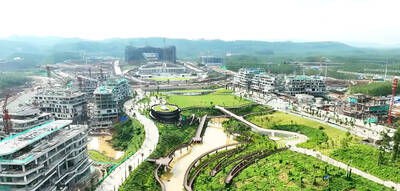Australian scientists are working to artificially produce the urine of wild dogs, hoping to keep other wild dogs away from humans and prevent them from destroying livestock, avoiding losses that mount into millions of dollars every year.
Researchers say the chemical message in the urine of dingoes, as the wild dogs are known, insists “this is my territory, stay out” — creating a “bio boundary” that the dogs and other wild animals cannot cross.
“We hope it would be a non-lethal tool for the management of dingoes in Australia,” said Alan Robley, senior research scientist at the Department of Sustainability and Environment, a government-funded research institute.

Photo courtesy of Henry Whitehead
照片由亨利‧懷特黑德提供
“You can use this non-lethal barrier to keep animals out of where people don’t want them — in their back yards or those sort of urban areas where towns are encroaching into the bush [wilderness], or on a farm where there are sheep and where dogs are coming in and attacking their sheep.”
Animals use chemical messages all the time to advertise their social status, whether or not they are sexually available and ready for reproduction, and things about their food. The messages come through the chemicals they excrete.
Scientists collect urine from captive dingoes — male and female, adults and juveniles — held in private collections around Australia. The urine is then sent to a laboratory where they can extract the molecular signature of the different chemicals that make up the urine.
“That analysis tells us how strong each of those chemicals are,” Robley said.
The chemicals are reproduced and presented back to the animals under test conditions to see how they respond.
It is believed that wild dogs cause roughly A$64 million (about NT$1.94 billion) in damage to livestock throughout Australia each year, A$18 million (about NT$545 million) in southern Victoria state alone.
“There’s a bit of work being done in Botswana on African wild dogs which is very similar to this, but no one’s tried to extract and identify the constituent chemical compounds of wild dogs or dingo urine before and use that in a management sense,” Robley said.
(Reuters)
澳洲科學家正試圖以人工方式,製造野狗尿液,希望藉此驅趕其他野狗靠近人類、防止牠們侵害家畜,並且避免每年高達上百萬元的損失。
研究員表示,澳洲犬尿液裡的化學信號,堅稱「這是我的地盤,勿近」─產生一個「生物界線」,使狗兒們與其他野生動物互不相犯。澳洲犬是當地野狗的統稱。
生態永續環保部門的資深研究科學家雅倫‧羅布里表示:「我們希望這是控管澳洲犬的一個非致命手段。」該部門是政府贊助的研究機構。
他說:「你可以利用這種非致命的界線,將動物從人們所不希望牠們進入的地方驅離,例如是他們的後院,或是那些侵佔荒野地區的城鎮,或是一座遭狗兒入侵攻擊羊隻的綿羊農場。」
動物無時無刻以化學信號宣示其社會地位、透露牠們是否正值發情期或準備繁衍後代,以及彰顯關於牠們食物的事宜。該信號來自牠們排泄出的化學物質。
科學家們蒐集不分公母老幼、被圈養的澳洲犬尿液,並將尿液存放在澳洲各地的私人蒐藏點,然後再將這些樣本送至附近實驗室,提取尿液中不同化學記號。
羅布里說:「那個分析告訴我們每種化學物質是多麼地強烈。」
這些化學物質被複製並送回給受試狀態下的動物,以觀察牠們的反應。
一般認為野狗對於整個澳洲家畜,每年所造成的損失大約是六千四百萬澳幣(約新台幣十九點四億元)。光是澳洲南部的維多利亞州,損失就高達一千八百萬澳幣(約新台幣五點四五億元)。
羅布里說:「非洲波紮那有對野狗,進行極類似的實驗,但之前從未有人試圖提取野狗或稱澳洲犬的尿液,並識別其組成化學化合物,或是從控管的觀點利用該化合物。」
(路透/翻譯:林亞蒂)

The human body was not built for spaceflight, with its microgravity conditions, exposure to high-energy radiation and other issues. As a result, trekking beyond the Earth’s confines causes many physiological changes that affect an astronaut’s health. The issue gained new currency with the March mission to return astronauts Butch Wilmore and Suni Williams to Earth after they were stranded on the International Space Station (ISS) for nine months. WHY IS SPACE TRAVEL TOUGH ON THE HUMAN BODY? The human body evolved over millions of years to function optimally in Earth’s environment, which includes its gravity, atmospheric composition and relatively low levels of

In another application of artificial intelligence, a team of archaeologists from the Nazca Institute at the University of Yamagata in Japan, in collaboration with IBM Research, have discovered 303 new geoglyphs in the “Nazca” region of Peru. Though these figures are not nearly as large as their Nazca Lines counterparts, their discovery has helped enhance the understanding of the transition from the Paracas culture to the Nazca culture. The AI model, assisted by low-flying drones, was able to accomplish what the naked eye could not—quickly and accurately spotting the smaller relief-type geoglyphs in the desert area. While it previously

Indonesia is undertaking an ambitious project to relocate its capital from Jakarta to Nusantara, a new city in the province of East Kalimantan. This bold endeavor aims to address the severe environmental challenges and urban congestion plaguing Jakarta. The current capital city struggles with acute air pollution, frequent flooding, and rapid land subsidence. Experts predict that by 2050, a third of Jakarta could be submerged. The primary causes include excessive groundwater extraction and rising sea levels attributed to climate change. Moreover, with a population of over 10 million, it’s very much the economic center of the country. Unfortunately, this

Dos & Don’ts — 想想看,這句話英語該怎麼說? 1. 王老師很負責,每天都準時到學校。 √ Miss Wang is conscientious. She comes to school on time every day. χ Miss Wang is very responsible. Every day she goes to school on time. 註︰一個人很認真、負責、敬業,英文通常用 conscientious 來表達,它的名詞是conscience(良心)。responsible 接在 be 動詞之後是指對某事負責,也可指做錯事時該負的責任,因此“她該負責”英文是 She is responsible for it.。如果某人很負責、值得信賴,可以託付重任,可說 She / He is a responsible person.。 2. 他個子不高。 √ He is not tall. χ His body is not tall. χ He is not high. 註︰high 通常指「物」的高大,tall 則指「人或細長物」的「高」。但講人的高度,有數字時可以說: He is six feet high. He is six feet tall. 3. 我能占用你幾分鐘嗎? √ Can you spare me a few minutes? χ May I occupy you a few minutes? 註︰spare:騰出,省下。不顧句型及前後文,只把學過的英文詞彙的中文解釋任意還原為英文時很容易造出這種中式的英文句子。 4. 讓我想想看。 √ Let me think it over. √ Let